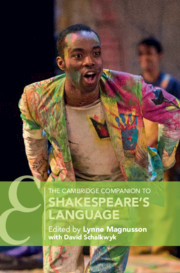Book contents
- The Cambridge Companion to Shakespeare’s Language
- The Cambridge Companion to Shakespeare’s Language
- Copyright page
- Contents
- Contributors
- Preface
- Abbreviations
- Part I Basic Elements
- Part II Shaping Contexts
- Part III New Technologies
- Part IV Contemporary Sites for Language Change
- Appendix Glossary of Rhetorical Figures
- Further Reading
- Select Bibliography
- Index
- Cambridge Companions to…
- References
Part III - New Technologies
Published online by Cambridge University Press: 01 July 2019
- The Cambridge Companion to Shakespeare’s Language
- The Cambridge Companion to Shakespeare’s Language
- Copyright page
- Contents
- Contributors
- Preface
- Abbreviations
- Part I Basic Elements
- Part II Shaping Contexts
- Part III New Technologies
- Part IV Contemporary Sites for Language Change
- Appendix Glossary of Rhetorical Figures
- Further Reading
- Select Bibliography
- Index
- Cambridge Companions to…
- References
Summary
There has never been a more exciting time to be working on Shakespeare’s language. If you have an internet connection, fire it up.
- Type
- Chapter
- Information
- The Cambridge Companion to Shakespeare's Language , pp. 149 - 204Publisher: Cambridge University PressPrint publication year: 2019

